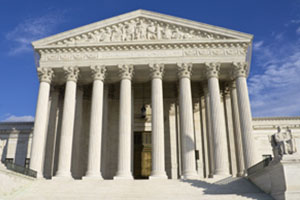Redistricting
Redistricting and Partisan “Gerrymandering”
Every 10 years, the Census Bureau and state legislators redraw district boundaries for seats in the U.S. House of Representatives, as well as for districts in their own state legislatures. The redistricting process seeks to ensure that each person’s vote counts equally and is not diluted by population shifts.
Article I, Section 4 of the U.S. Constitution reserves authority over elections to the states. Historically, state legislatures have controlled the apportionment process for their own legislative districts and congressional districts in accordance with their state constitutions. After decades of holding political majorities at the federal, state and local levels, the Democratic Party lost significant numbers of state legislative seats and in 2010 effectively lost its control over the redistricting process. The Left is now seeking to restore Democratic political power by stripping state legislators of their authority over the redistricting process.
When you can’t win by the rules, you try to change the rules. Today, the Left is uniting around removing state legislators entirely from the redistricting process in favor of a non-partisan or “independent commission” approach. ACRU Policy Board member Hans von Spakovsky, a senior legal fellow for the Heritage Foundation, argues that disconnecting the redistricting process from the oversight of the electorate would be very harmful to the nation:
“So-called independent commissions remove accountability —- commissioners are not accountable to voters for what they do, unlike legislators. Commissioners just move the politics of redistricting behind closed doors.”1
Non-partisan or independent commissions are never truly non-partisan or independent. They are chosen by individuals with partisan interests, and since they are not elected, they are not accountable to the people.
One insightful description of non-partisan commissions appeared recently at National Review.
If you believe that those so-called independent commissions dreamed up by our would-be electoral reformers would in fact prove non-partisan, consider how non-partisan and independent our non-partisan and independent media are —- or consider how easy it is to predict which justices will vote which way in any politically charged case before our non-partisan and independent Supreme Court.2
Another Leftist ploy is to involve the courts in determining the appropriate amount of partisan “gerrymandering” —- i.e. determining how much politics is enough or too much.
Hans Von Spakovsky explains why this is problematic:
Over 70 years ago, Justice Felix Frankfurter warned the Supreme Court against getting into the “political thicket” of redistricting. In Colegrove v. Green, he said that the court should not get into the business of drawing political maps. But starting in the early 1960s, the Supreme Court ignored that warning. It has since handed down a series of decisions regarding redistricting. Unfortunately, the rules established in these decisions are very confusing, which is why there are more redistricting cases before the Supreme Court almost every term.
… Drawing up political districts is, by its very nature, a political exercise by the legislative branch. How could one possibly determine how much or how little politics is acceptable in the redistricting process? The Constitution says nothing about this at all, other than to give state legislatures the authority to draw not only their own state legislative districts, but congressional districts as well.3
In addressing this important issue, constitutional principles must be upheld. The drawing of district boundaries should reflect the will of the people, and conducted through the state legislatures, not unelected bureaucrats or commissions. Involving the courts in redistricting opens the door to non-stop litigation and politicizing of the courts. This approach would insert the judicial branch into the most political of legislative activity and severely undermine the doctrine of separation of powers.
FOOTNOTES
1. Quoted in Logan Churchwell, “SCOTUS Throws Cold Water Early on Obama’s Partisan Gerrymandering Project,” Breitbart, June 19, 2017, at: https://www.breitbart.com/texas/2017/06/19/scotus-throws-cold-water-early-obamas-partisan-gerrymandering-project/↩
2. Kevin D. Williamson, “In Praise of Gerrymandering: Political Exercises Are Political,” National Review, June 21, 2017, at: https://www.nationalreview.com/article/448801/gerrymandering-supreme-court-case-redistricting-legislature-republicans-democrats↩
3. Hans von Spakovsky, “The Supreme Court Agrees to Tackle the Biggest Election Law Case in Years. Will It ‘Weaponize Our Federal Courts?” FoxNews.com, June 20, 2017, at: https://www.foxnews.com/opinion/2017/06/20/supreme-court-agrees-to-tackle-biggest-election-law-case-in-years-will-it-weaponize-our-federal-courts.html↩
ACRU Commentary
Texas Case Suggests Court May Overhaul Voting Rights
Former U.S. Solicitor General Clement told U.S. Supreme Court justices that lower federal courts cannot redraw state-approved election district maps unless they can point to concrete "identifying specific statutory or constitutional violations."
Voter ID Terrifies Democrats
The most consequential election in our lifetime is still 10 months away, but it's clear from the Obama administration's order halting South Carolina's new photo ID law that the Democrats already have brought a gun to a knife fight. How else to describe this naked assault on the right of a state to create minimal requirements to curb vote fraud?
News
Lawsuit Challenging Wisconsin Redistricting Laws Dismissed
7/3: A panel of federal judges dismissed a lawsuit that challenged Republican-drawn districts in Wisconsin.
Gerrymandering Symposium: Janus-Like Judicial Restraint in Political Gerrymanders and the Census
6/28: Supreme Court precedent is clear that “a jurisdiction may engage in constitutional political gerrymandering” and that “political considerations are inseparable from districting and apportionment.”
SCOTUS Gerrymandering Ruling a Blow to Liberal Activists
6/28: National Democratic Redistricting Committee was dealt a major blow when the Supreme Court ruled that federal courts should not be involved in state redistricting cases.
SCOTUS Holds That Lawmakers, Not Judges, Should Control Gerrymandering
6/27: The Supreme Court ruled that gerrymandering decisions should be made by lawmakers instead of settled in the courts.
Spakovsky: The Supreme Court Made the Right Decision on Gerrymandering
6/27: ACRU Policy Board Member Hans von Spakovsky explains why the U.S. Supreme Court made the right decision, giving lawmakers the power over gerrymandering.
Supreme Court Sides with Democrats in Virginia Gerrymandering Case
6/17: The Supreme Court ruled that Republicans can't independently appeal court ordered redistricting in Virginia.





